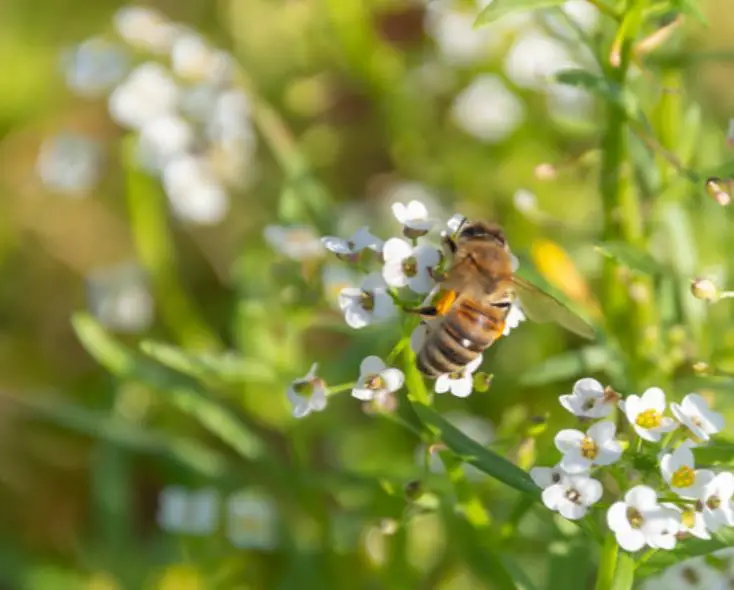If you live in deer-prone areas, you would be familiar with the destruction these animals can do to the garden. So, when someone suggests planting alyssum because of their appealing scent and flowers, you’ll instinctively ask “are alyssum deer-resistant?”
Yes, alyssum are deer-resistant plants! Perhaps this is due to the unappetizing taste of alyssum flowers, seeds, and leaves.
Also, the ability for alyssum to self-seed does make them a better plant for gardens prone to deer visits.
Why Is Alyssum Deer-Resistant?
The Alyssum plant has managed to find a way to evade a deer’s hunger.
Alyssum is anything but tasty and deer have so many more options to choose from. This taste doesn’t align with deers’ typical food and you will find them moving on to other options in the garden.
Deer will prefer to eat Hostas, Daylilies, and English Ivy. When it comes to vegetables they like Cole crops (broccoli, Brussel sprouts, and cabbage)
Occurrences When Deer Would Eat or Damage Alyssum
Alyssum is not on the list of deer’s favorite food. However, there can be instances where deer may be forced to try and eat alyssum. Or, depending on the season, alyssum may just be the victim of the deer’s damaging actions.
Here are some instances of cases for both alyssum being eaten or damaged by deer.
a. Food Scarcity
Deer often find themselves desperate for food when most of their food sources are eaten or succumb for any reason. As a result, the deer may take their chances and eat any plant available to them, meaning alyssum as well!
b. Alyssum Positioned Near Desirable Food
If you’ve planted an alyssum near plants that deer love to feed on, chances are high they will take a bite or two out of your alyssum. Although the deer will soon discover that the alyssum is not very palatable, they may still damage the plants. You could call this unlucky plant positioning!
c. Damage Due to Rubbing
Male deer will often damage plants and shrubs while trying to rub off the velvet coating that grows over their antlers in the winter season. This coverage usually has an important growth factor that helps in maintaining the antlers.
During the process of rubbing, deer can damage trees, and even shrubs, unfortunately, alyssum is short and may get stamped on my deer.
Does Alyssum Come Back After Deer Damage?
Yes, alyssum is unique in the way it can come back after extensive damage by deer if it occurs after flowering. This property comes from the fact that these plants are self-seeding plants.
After flowering, alyssum puts in a lot of time and energy to produce viable seeds. Although these seeds may not be up to the mark in terms of quality, they will still have all the features of an alyssum plant. Making it a cost-efficient garden option if deer visit your garden often.
If the deer trample the alyssum plants, the alyssum seeds will re-grow immediately if conditions allow. Otherwise, they will grow the following year when the desirable season arrives.
How to Keep Deer Away from Alyssum?
If you have a collection of flowers besides alyssum that you think the deer might find interesting, you must keep the deer out. In many states in the USA, deer are a common garden pest. Frequent visits from them could compromise your garden, indefinitely!
1. Fencing
Installing a towering fence system is usually the best way to keep deer out permanently. It may also help to keep other intruders out for good! But, we warn you, this could prove costly since the fence needs to be no lower than 10 feet tall (3 meters).
2. Planting Deer Repelling Plants
Deer are very sensitive to herbs and spices. Planting such items in your garden could dissuade deer from eating plants and even visiting your garden! Throughout your garden, you could scatter herbs, and even place them near plants that are at risk of deer eating them.
3. Light and Sound Systems
Deer can be scared off by lights and sounds. Using motion detection sensors you can make the system automatically turn on when deer motion is detected. Doing this will help to scare away deer before they get comfortable and have enough time to damage garden plants.
What Does Deer Resistance Mean?
Deer resistance with regards to plants often means plants that are not appetizing to deer for one of two reasons.
1. Repulsive Taste
Deer don’t like to eat every plant. Some taste nice while others appear horrible and repulsive to the taste buds of the deer. Alyssum would not attract deer as their taste is peppery and spicy like mustard.
2. Overpowering Scent
Plants that have an overpowering scent will not attract deer. In fact, they will do the opposite and keep them away. This is why people plant herbs like mint and lavender in their gardens. Although alyssum has a honey-like scent they taste nothing like honey!
Is Alyssum Poisonous To Humans? What about Cats, Dogs, or Horses?
Conclusion
Alyssum is a deer-resistant plant that is safe to plant if these animals are frequent visitors in your garden. This would bring about a sigh of relief to people who can’t seem to have any flowering plants in the garden due to their guests!
These alyssum plants are not as tasty as they look and smell. Therefore by now, deer have realized alyssum is not of much importance to them. However, deer might not eat alyssum but they may be damaged while they rub trees/shrubs or trample through your garden!
You can protect your alyssum and other garden plants by putting up a fence, planting deer deterrent plants (herbs and spices), and using light and sound systems.
FAQs
Yes, alyssum is rabbit resistant. Alyssum is not appealing to rabbits because of its spicy and peppery taste. With their attractive flower colors and sweet scent, they will instead attract pollinators and beneficial insects to your garden.
Deer do not eat alyssum by choice. However, if desperate they may decide to take a few bites if there are no other food prospects in sight! Otherwise, when given a choice, they will steer clear of alyssum plants.


